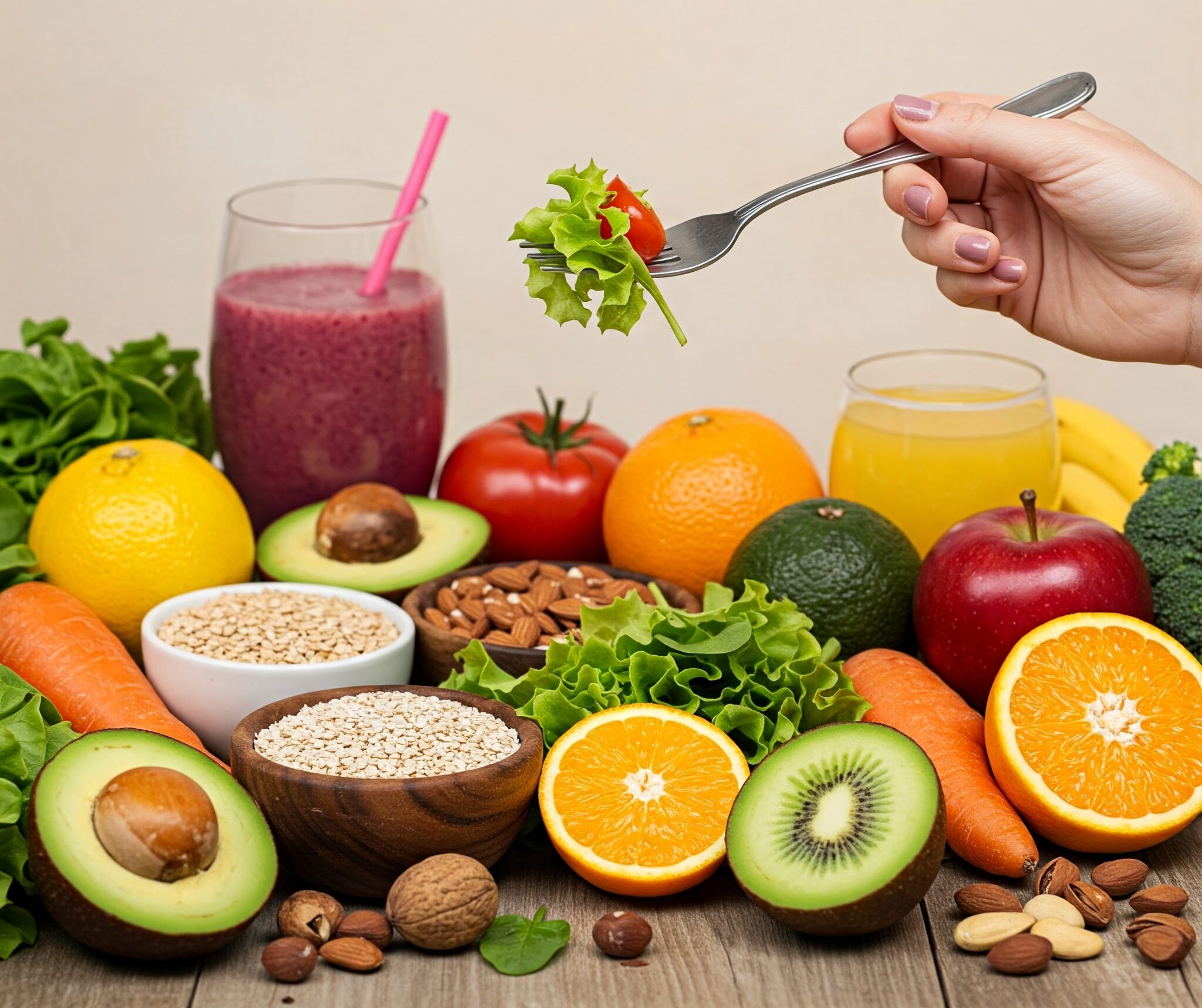Best Diet and Nutrition Tips for Healthy Eating in 2025
What Is Diet and Nutrition?
Diet refers to the types of food and beverages a person regularly consumes. It’s not just about weight loss or trendy food plans—it’s your day-to-day eating pattern. Whether you’re sipping green smoothies, enjoying home-cooked meals, or grabbing fast food, all of it makes up your diet. It includes your:
- Food choices (plant-based, high-protein, balanced, etc.)
- Meal timing (how often you eat)
- Portion sizes and eating habits
- Cultural, personal, or religious influences on food
Your diet is personal—it’s a reflection of your lifestyle, preferences, health goals, and even emotions.
Nutrition, on the other hand, is the science behind how food affects your body. It’s about how your body takes the nutrients from your diet and uses them to grow, repair, and function properly. Nutrients include:
- Macronutrients (carbohydrates, proteins, fats) – provide energy
- Micronutrients (vitamins and minerals) – support metabolism and immunity
- Water – essential for every cell and body function
- Fiber – supports digestion and gut health
Good nutrition means feeding your body what it needs in the right amounts. It’s not just about eating less or more—it’s about eating smart.
1. What Exactly Does “Healthy Eating” Mean Anymore?
The phrase gets thrown around like confetti at a wellness festival, but its meaning? Often lost in the noise.
At its core, healthy eating is about kindness—to your body, your mind, and your life rhythm. It’s not about punishment or penance. It’s about power and presence at the plate.
Ditch the restrictive labels and lean into:
- Whole foods—the kind that come from the earth, not a factory conveyor belt.
- Colorful plates brimming with vegetables, legumes, whole grains, lean meats, and plant-based proteins.
- Mindful portions that align with your body’s cues, not someone else’s app.
🥦 If it has 27 ingredients and your great-grandmother wouldn’t have known what it was—put it back on the shelf.
Need help creating better grocery lists? Read our smart grocery planning tips.
2. Are Carbohydrates the Nutritional Bad Guys?
Let’s clear this up once and for all: Carbs are not the enemy—they’re essential.
The real culprits? Highly refined and processed sugars masquerading as “quick snacks” or “energy bars.” What your body craves instead are complex carbohydrates—rich in fiber, slow to digest, and kind to your blood sugar.
Choose:
- Hearty oats for long-lasting energy
- Brown rice and quinoa as mineral-rich staples
- Naturally sweet pumpkin or sweet potatoes that satisfy and nourish
🚫 Avoid white bread and sugary cereals pretending to be healthy. They’re nutritional mirages.
3. Why Hydration Is a Silent Nutritional Powerhouse
Water often plays second fiddle in health conversations, but make no mistake—it’s the lifeblood of every bodily function.
Why hydration deserves center stage:
- Transports nutrients with VIP service through your bloodstream
- Keeps joints cushioned, organs cleansed, and digestion humming
- Helps regulate hunger (sometimes what feels like hunger is just thirst in disguise)
💧 Don’t wait till your lips feel like sandpaper. Sip consistently—your skin, gut, and brain will thank you.
Discover more about the importance of hydration and daily water intake.
4. Are Supplements a Shortcut or Just a Sidekick?
Pop a pill and skip the spinach? If only.
Supplements should amplify, not replace, a nourishing diet. They’re backup singers, not the lead performer.
You may need them when:
- You’re low on iron, vitamin D, or B12 (common with vegan or vegetarian diets)
- Chronic illness affects nutrient absorption
- You’re in a life stage needing extra (think pregnancy, aging, or intense training)
🔬 But remember—random supplement stacking can backfire. Consult a pro, and always opt for food first when possible.
5. Is Intermittent Fasting a Health Game-Changer or Just Hype?
Intermittent fasting (IF) isn’t snake oil—but it’s not a miracle cure either.
Done right, it may:
- Help reset insulin sensitivity
- Support cellular renewal (hello, autophagy)
- Encourage a leaner body composition without overanalyzing every bite
That said, it’s not for everyone. People with a history of disordered eating, pregnancy, or chronic illness should approach with caution. What matters most? Sustainability and how your body responds, not trends.
⏰ IF is a tool in the box—not the whole toolbox.
FAQs – Your Burning Questions, Answered Honestly
Q: Do I need to track calories to stay healthy?
Nope. Obsessive tracking can harm more than help. Instead, build meals around whole, nutrient-rich foods and honor your hunger/fullness signals.
Q: Is late-night eating terrible?
It depends on what and why you’re eating. A balanced meal at 9 PM is worlds better than emotional snacking at midnight.
Q: Should I cut fat to lose weight?
Absolutely not. Healthy fats (avocado, fatty fish, nuts) are essential for hormone balance, brain health, and satiety.
Q: Is there one perfect diet?
No—and that’s the beauty of it. Your ideal diet is personal, flexible, and shaped by your lifestyle, culture, health status, and taste buds.
DISCLAIMER
This content is intended solely for educational and informational purposes. It is not meant to replace professional medical or nutritional advice. Always consult with a licensed healthcare provider or registered dietitian before making significant dietary changes. Your health journey deserves expert attention and tailored guidance.
CONCLUSION: Choose Food That Loves You Back
Eating well doesn’t require apps, trends, or deprivation—it requires attention, self-awareness, and compassion.
Try this week:
- Toss some dark leafy greens into your stir fry
- Ditch soda for sparkling water with a citrus twist
- Reflect on how you feel after a meal—not just during
Food is not the enemy—it’s one of the most profound ways we care for ourselves. Let it be joyful, flavorful, and deeply human.
💬 What’s one food rule you ditched that made you feel freer and healthier? Let’s swap stories in the comments below. Your insight might just be the light someone else needs.
Visit Our Site For More Info (NutraBloomLab.com)
